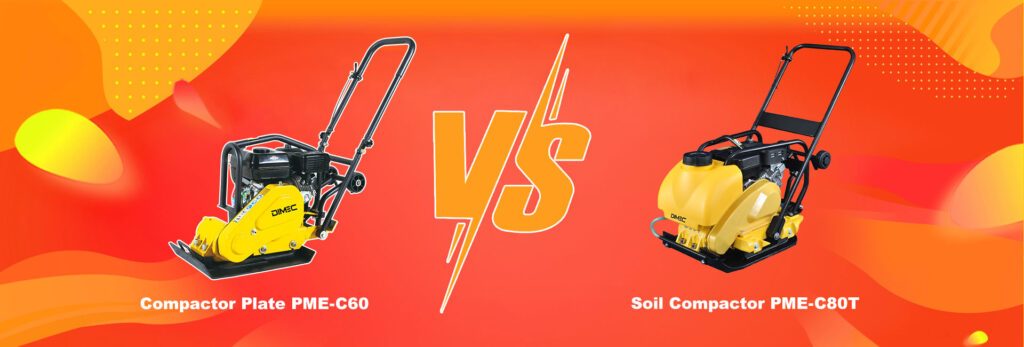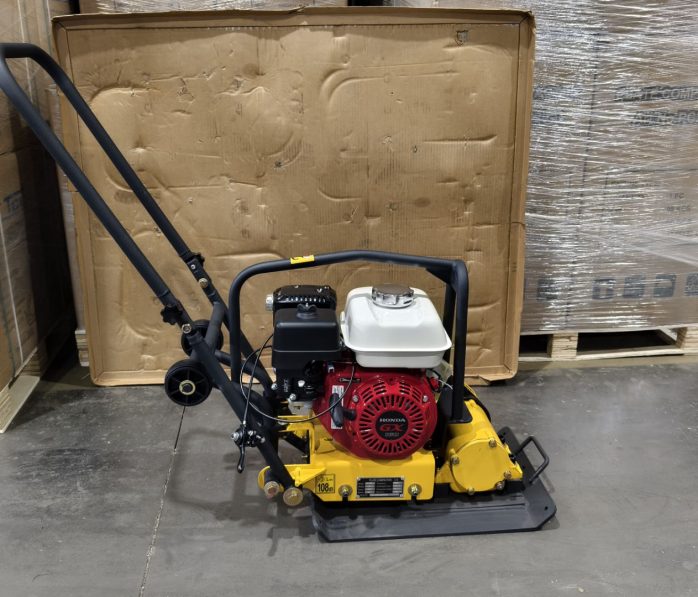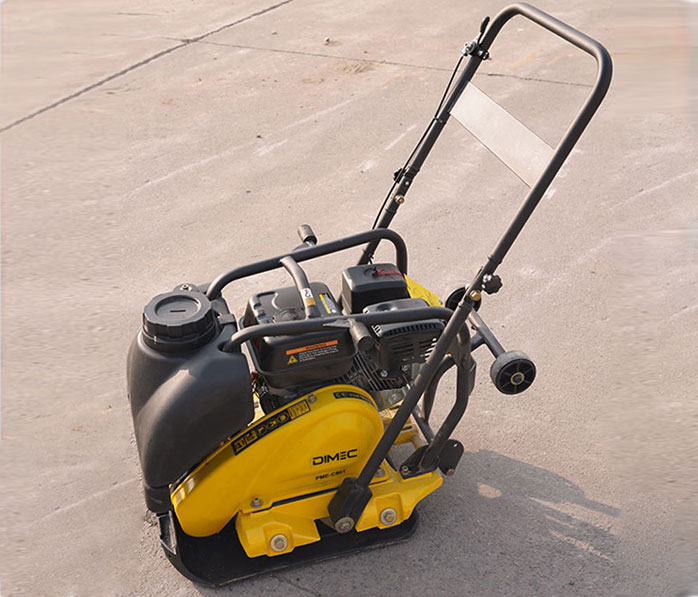Compactor Plate PME-C60 vs Soil Compactor PME-C80T: Making the Right Choice for Your Projects
- DIMEC
- Compactor Plate, Soil Compactor
Home » Compactor Plate PME-C60 vs Soil Compactor PME-C80T: Making the Right Choice for Your Projects

Table of Contents
In the realm of construction and soil compaction, choosing the right equipment is crucial for project success. This article delves into a detailed comparison between the Compactor Plate PME-C60 and the Soil Compactor PME-C80T, helping you make an informed decision based on your project’s unique requirements.
Technical Specification
| Model | Compactor Plate PME-C60 |
|---|---|
| Engine | Honda / Robin / Loncin / Diesel engine |
| Engine type | Air-cooled, single cylinder, 4-stroke, petrol engine / diesel engine |
| Frequency [VPM] | 5600 |
| Centrifugal force [KN] | 12 |
| Plate size (LxW) [cm] | 50x36 |
| Max.compaction depth[cm] | 28 |
| Travel speed [m/min] | 25 |
| Max.inclination angle | 20° |
| N.W./G.W. [kg] | 65/70 |
| Package (LxWxH) [cm] | 75x38x56 |
| Model | Soil Compactor PME-C80T |
|---|---|
| Engine | Honda / Robin / Loncin / Diesel engine |
| Engine type | Air-cooled, single cylinder, 4-stroke, petrol engine / diesel engine |
| Frequency [VPM] | 5500 |
| Centrifugal force [KN] | 14 |
| Plate size (LxW) [cm] | 53x50 |
| Max.compaction depth[cm] | 30 |
| Travel speed [m/min] | 25 |
| Max.inclination angle | 20° |
| N.W./G.W. [kg] | 90/95 |
| Package (LxWxH) [cm] | 75x53x54 |
1. Product Overviews
Compactor Plate PME-C60
The PME-C60 is a compact yet highly versatile piece of equipment. Its cast-iron base plate, with carefully engineered dimensions, provides a stable foundation for efficient compaction in medium-sized areas. Powered by either a petrol or diesel engine, it offers flexibility in fuel selection. This engine is not only reliable but also fuel-efficient, making it an economical choice for projects with budget constraints. Weighing [N.W./G.W. 65/70kg], the PME-C60 is lightweight, facilitating easy transportation. Its compact design allows it to access tight spaces with ease, making it a popular choice for residential and small-scale commercial projects where space is at a premium.
Soil Compactor PME-C80T
The PME-C80T is a heavy-duty machine designed to handle large-scale and demanding projects. It features a larger vibrating plate, sized 64 x 42 cm, which provides increased ground contact and a higher compaction force of 15 KN per square foot. Driven by a more powerful engine, typically around 5.5 HP, it operates at a frequency of 4,200 VPM. One of the most significant features of the PME-C80T is its integrated water tank. This water tank can moisten the soil during compaction, which is particularly useful for certain types of soil, improving the compaction quality and reducing dust. The machine is designed to achieve a maximum compaction depth of 35 cm and has a travel speed of 25 m/min. It is built with reinforced components, including high-strength bolts and a robust engine frame, making it suitable for heavy-duty and continuous use.
2. Performance Comparison
Engine Power and Efficiency
The PME-C60’s engine provides a stable power supply for standard compaction jobs. However, it pales in comparison to the PME-C80T. The PME-C80T’s 5.5 HP engine offers significantly more force, enabling it to work more efficiently on larger areas and in tougher soil conditions. For instance, in a large-scale industrial site development, the PME-C80T can complete compaction tasks in a fraction of the time it would take the PME-C60.
Plate Size and Compaction Force
The PME-C60 has a plate size optimized for medium-sized areas, striking a balance between precision and coverage. In contrast, the PME-C80T benefits from its larger 64 x 42 cm plate. The increased contact area with the ground results in a higher compaction force of 15 KN per square foot, making it perfect for large-scale projects like extensive road construction, commercial paving, and high-traffic area compaction.
Operational Speed and Coverage
The PME-C60 operates at a speed of [travel speed 25m/min], which is suitable for precise and controlled compaction. The PME-C80T, with its more powerful engine and larger plate, operates at a travel speed of 25 m/min. This, combined with its higher compaction force, allows it to cover larger areas in less time, making it a top choice for projects where time-efficiency and extensive coverage are crucial.
3. Applications and Ideal Projects
When to Choose the Compactor Plate PME-C60
- Residential Construction: Ideal for tasks such as building small driveways, patios, and backyard walkways. Its compact size allows it to work in tight spaces around homes without causing damage to surrounding structures.
- Small-Scale Commercial Projects: For small businesses looking to create or renovate outdoor areas, such as small parking lots or loading docks, the PME-C60 provides a cost-effective and efficient solution.
- Soil Types Requiring Gentle Compaction: In areas with soft or sandy soils that don’t need excessive force for compaction, the PME-C60 can achieve the necessary compaction levels while maintaining a high level of precision.
When to Choose the Soil Compactor PME-C80T
- Large-Scale Commercial Projects: Projects like roadworks, large-scale paving, and high-traffic area construction require the power and capabilities of the PME-C80T. Its larger plate, higher compaction force, and faster travel speed can ensure deep and uniform compaction over vast areas.
- Tough Soil Conditions: When dealing with tough soil conditions that need extra force for compaction, the PME-C80T’s superior engine and reinforced design come in handy.
- Projects Requiring Soil Moisture Management: The water tank feature on the PME-C80T is beneficial for projects where soil moisture management is important, such as in some types of road construction or when working with dry, dusty soils.
4. Operational Considerations
Ease of Use and Ergonomics
Both machines are designed with operator comfort in mind. The PME-C60 has a simple control panel and a low-vibration design, making it easy to operate, even for those with little experience. Operators can work for extended periods without experiencing excessive fatigue. The PME-C80T, despite its larger size and higher power, also incorporates ergonomic features. The controls are well-placed and easy to reach, and the shock-absorption system minimizes vibrations, ensuring a comfortable working experience.
Maintenance Requirements
Regular maintenance is essential for both machines to ensure peak performance. The PME-C60 has a relatively simple design, making maintenance tasks such as oil changes, air filter cleaning, and plate inspections straightforward. The PME-C80T, while more complex due to its larger components and high-performance engine, comes with a comprehensive maintenance manual. Regular checks of the engine, plate, and other components are necessary to keep the machine in top condition.
Cost-Benefit Analysis
The PME-C60 has a lower initial cost, making it an attractive option for small-scale projects with limited budgets. Its fuel efficiency and low maintenance requirements further contribute to its cost-effectiveness. However, for large-scale projects, the PME-C80T offers better long-term value. Although it has a higher upfront cost, its ability to complete projects more quickly and efficiently can result in significant savings in terms of labor costs and project timelines.
5. Conclusion
In conclusion, the choice between the Compactor Plate PME-C60 and the Soil Compactor PME-C80T depends on the specific requirements of your project. If you are working on small-scale, precision-oriented projects in tight spaces with budget constraints, the PME-C60 is the better option. It offers versatility, ease of use, and cost-effectiveness. However, for large-scale, heavy-duty projects where speed, high compaction force, and soil moisture management are important, the PME-C80T with its water tank is the clear winner. By understanding the differences in their features, performance, and applications, you can confidently select the machine that will ensure the success of your construction or landscaping project.
6. Frequently Asked Questions
FAQ 1: What is the main difference between the PME-C60 and the PME-C80T?
The PME-C60 is a compact and versatile plate compactor suitable for small to medium projects, offering precision in confined spaces. The PME-C80T is a heavy-duty soil compactor with a larger plate, more powerful engine, and a water tank. It is designed for large-scale applications requiring deep and uniform compaction, especially in projects where soil moisture management is necessary.
FAQ 2: Which machine is better for confined spaces?
The PME-C60 is better suited for confined spaces due to its smaller size and lighter weight. It can be easily maneuvered in tight areas, making it perfect for tasks like compacting soil in small backyards or narrow construction sites.
FAQ 3: How do the engine powers compare between these models?
The PME-C60 is powered by an engine that provides sufficient power for moderate projects. The PME-C80T typically features a more powerful 5.5 HP engine. This higher-powered engine delivers a higher vibration frequency and compaction force, enabling it to handle more demanding tasks.
FAQ 4: What types of projects benefit most from the PME-C80T?
Large commercial projects such as road construction, large-scale paving in shopping malls or industrial areas, and high-traffic area compaction benefit the most from the PME-C80T. Its ability to achieve deep compaction quickly and manage soil moisture makes it ideal for these applications.
FAQ 5: How do both machines ensure operator comfort during prolonged use?
Both machines incorporate advanced low-vibration technology and ergonomic controls. The PME-C60’s design minimizes fatigue in tight spaces with its low-vibration system and easy-to-handle controls. The PME-C80T uses reinforced shock absorption systems and intuitive handling features to provide comfort even during heavy-duty operations.
Plate Compactor X Tamping Rammer X Road Roller
You May Also Like
4 Types of Dirt Compactors for Different Projects
How to Use an Electric Plate Compactor Effectively
Portable Cement Mixer Buying Guide: 15 Must-Know Facts for Smart Construction
8 Important Factors to Consider Before Purchasing a Soil Compactor
7 Key Features to Look for When Choosing a Jaw Crusher
How to Select the Best Diesel Welder Generator for Your Needs
Preferred Brands of Engineering Compaction Equipment
Three Core Product Lines for Efficient Construction

Plate Compactors (40KG - 750KG)
We offer a wide range of models from light to heavy - duty. Modular design fits multiple jobs like municipal work and asphalt repair.

Tamping Rammers (32KG - 90KG)
Nine models with Honda/Robin/Loncin power. Smart fuel control and ergonomic design. Ideal for trench and slope work.

Road Rollers (0.3T - 5.5T)
Multi - level amplitude for different materials, and real - time compaction monitoring. Serve all road - building stages.

